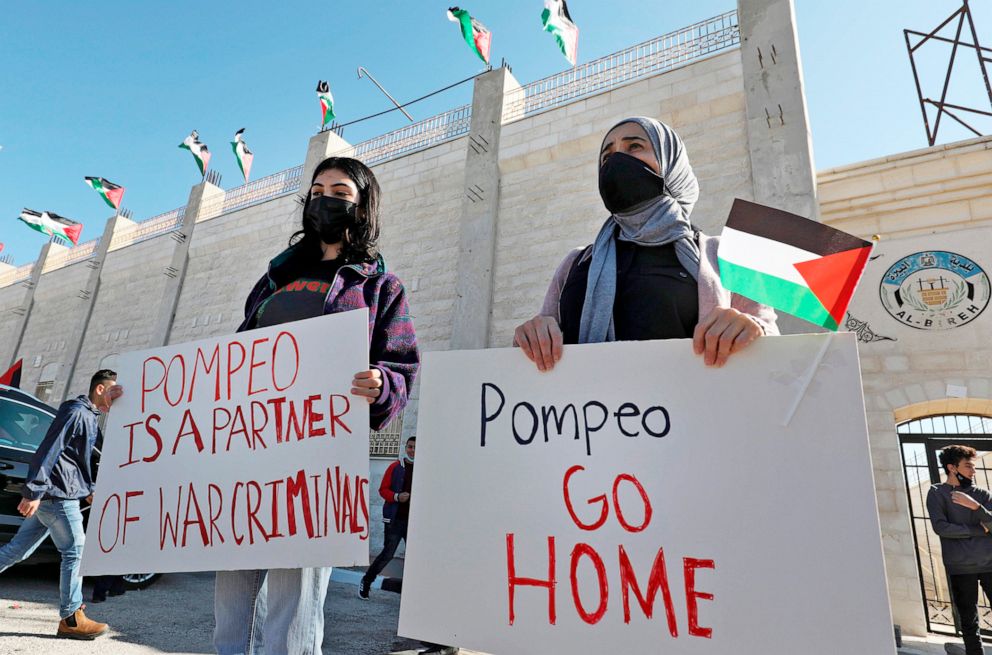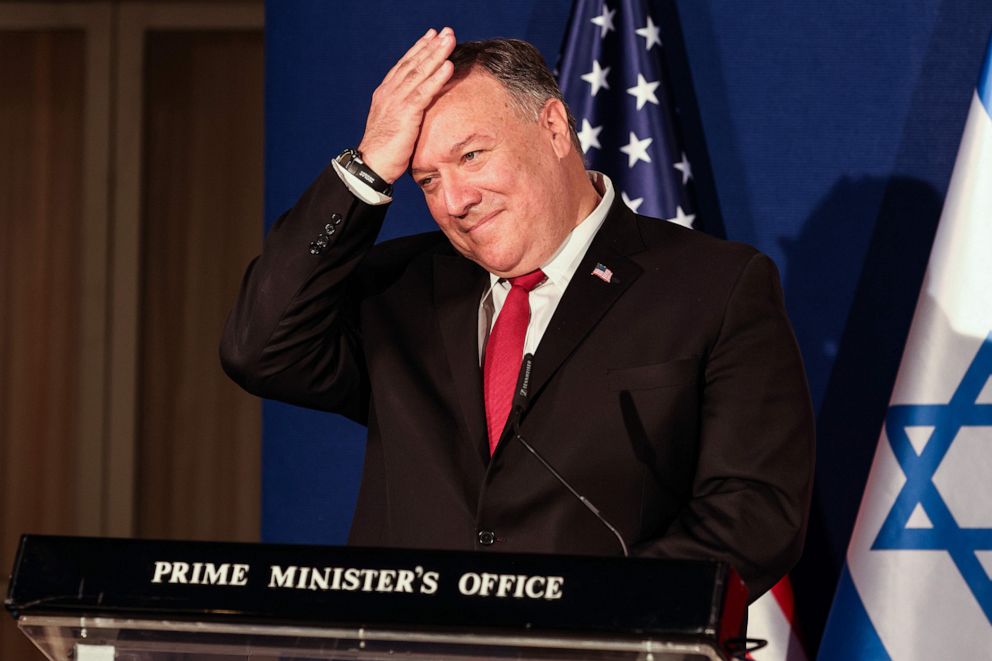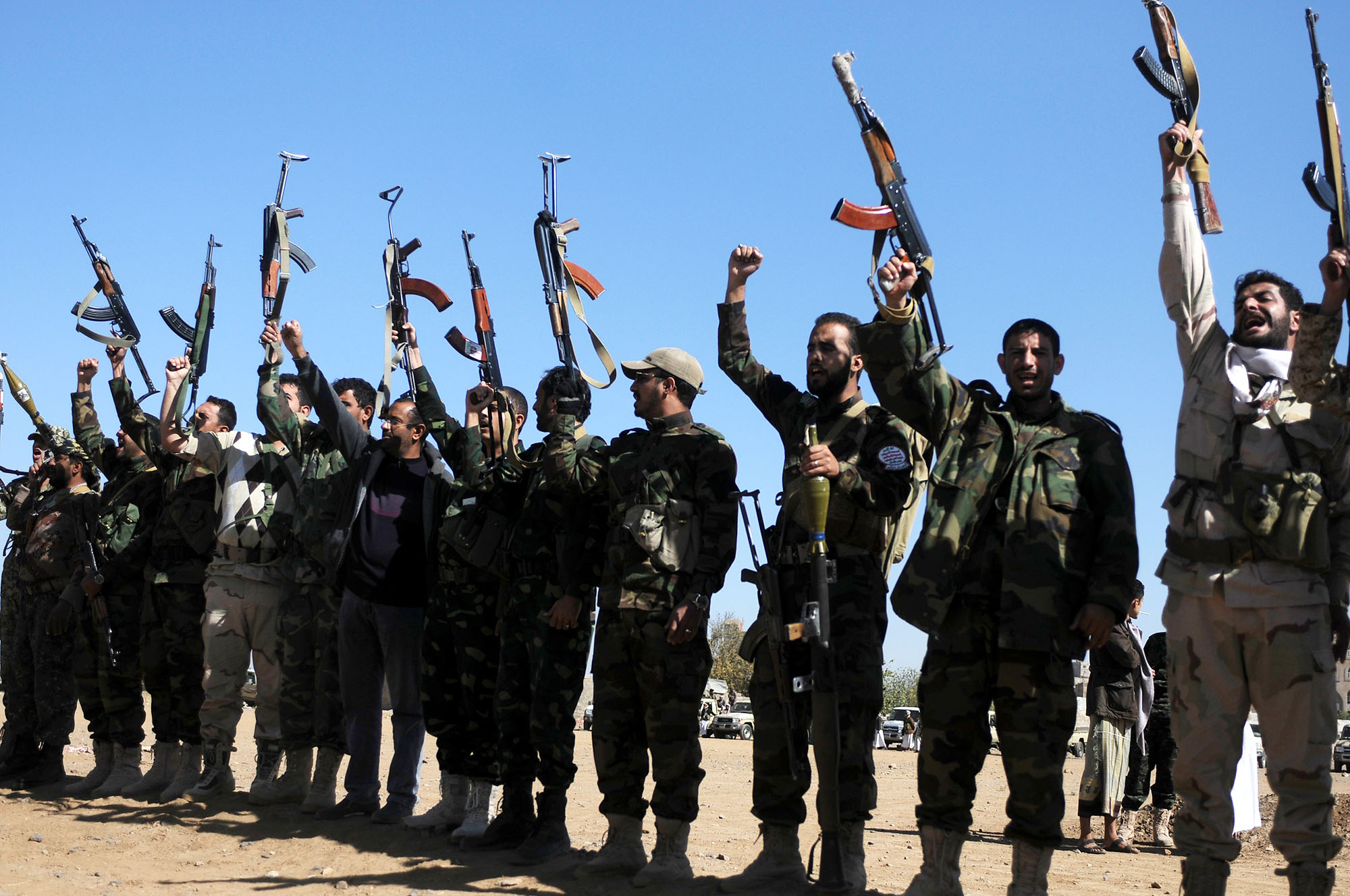Trump admin cementing legacy with Israeli settlement visit, Yemen and Iran sanctions
Secretary of State Pompeo broke precedent again during his Mideast tour.
With the clock ticking on the Trump administration, Secretary of State Mike Pompeo is breaking precedents with a tour of Israeli-occupied land and pushing to cement a foreign policy legacy for an administration in denial that is in its final days.
That includes a sweep of new sanctions on Iran, symbolic gestures in support of hard-line Israeli positions and sanctioning Yemeni rebels in a move humanitarian groups warn could cost lives. Critics call it a salted-earth strategy meant to box in Joe Biden's incoming administration -- something Pompeo himself seemed to embrace.
President Donald Trump's "maximum pressure" campaign on Iran "is working, sanctions will continue and the United States will not hesitate to impose painful consequences on those who engage in sanctionable activity. Throughout the coming weeks and months, we will impose new sanctions on Iran," Pompeo said Wednesday.
That statement was issued shortly before Pompeo arrived in Jerusalem, where he has sawed away at norms this year -- addressing his party's political convention in August and on Thursday becoming the first Secretary of State to visit an Israeli settlement in the West Bank and the Israeli-annexed Golan Heights.

"This is a part of Israel -- and a central part of Israel," Pompeo said in the Golan Heights, disparaging the "salons in Europe" and "elite institutions in America" that said the region should be returned to Syria after Israel seized it during the 1967 Six-Day War. In March 2019, Trump recognized Israel's annexation of the territory, making the U.S. the only country in the world to do so.
Earlier in the day, Pompeo visited Israeli settlements in the West Bank, starting at Qasr el-Yahud, the traditional site of Jesus' baptism in the Jordan Valley, according to a State Department official. U.S. press were barred from traveling with him.
Afterwards, he visited the Psagot Winery near the Israeli settlement of Psagot, a vineyard popular among evangelical Christian Americans. Pompeo and its owner met in July in Des Moines, Iowa, at the Family Leadership Summit, hosted by evangelical leader Bob Vander Plaats, who told ABC News, "Secretary Pompeo should be commended for his support of Israel, and I think it's a good thing for the U.S. secretary of state to visit Judea and Samaria," the Biblical and Israeli names for the West Bank.
While Pompeo was there, he announced that the State Department will require that all goods made in "areas where Israel exercises the relevant authorities" be marked as "made in Israel" when they're exported to the U.S. That means any product made in Israeli settlements, which the U.S. does not officially recognize, can be labeled as a product of Israel -- creating an official-unofficial recognition of Israeli control of contested lands.
While U.S. labels now say "West Bank/Gaza," the new policy also requires that goods made "where the Palestinian Authority maintains relevant authorities" be marked as from the "West Bank" and those made in Gaza marked "Gaza." That essentially splits Palestinian territory into two separate places, which Palestinian leaders said undermines the idea of a unified Palestinian state.
Among the products available for export to the U.S. are a Psagot Winery wine named after Pompeo. The winery produced a limited edition red blend of Syrah, Merlot and Cabernet Sauvignon named for the top U.S. diplomat after he blasted the European Court of Justice for its ruling last November that products made in Israeli settlements must be labeled as such, not as from "Israel."

Pompeo also announced Thursday that the U.S. will identify organizations that support the Palestinian Boycott, Divestment, Sanctions (BDS) movement, which opposes Israel's settlement policies, as anti-Semitic and withdraw U.S. support for them.
Pompeo has long called the BDS movement anti-Semitic, equating criticism of Israeli policies with hatred of Jews -- which is itself considered anti-Semitic by some Jews. But this change now codifies that view into U.S. policy and will have real-world implications, including possibly funding for Palestinian or human rights groups like Amnesty International or Human Rights Watch that are deemed supportive of BDS.
Hanan Ashrawi, a leading Palestinian politician, called Pompeo's visit and announcements "a last-ditch effort by the outgoing U.S. administration to entrench its pattern of criminality, illegality, and direct complicity in the colonization of Palestine and dispossession of our people."
"It is also a cynical exploitation by Mr. Pompeo to advance his own personal political goals as the new face of far-right ideologues in the U.S," she said. "Such malicious measures are intended to corner the incoming U.S. administration with layers of legal and administrative measures that maintain the destructive Trump legacy beyond his disruptive term."
That also seems to be the goal of a new blitz of sanctions related to Iran that will include sanctioning the Houthi rebels in Yemen, according to three sources briefed on the matter.
The Houthis, a northern Yemeni force who have been battling the Yemeni government since late 2014, control about a quarter of the country, but it's where the vast majority of the population lives. Saudi Arabia, the United Arab Emirates and their U.S.-backed coalition have been supporting the government, including with an air campaign that has drawn accusations of war crimes, while Iran has increasingly armed the Houthis since the start of the conflict.

While individual leaders have faced U.S. sanctions, sanctioning the entire insurgency -- known formally as Ansar Allah -- risks exacerbating what the U.N. calls the world's worst humanitarian crisis, according to aid groups.
If the State Department designates the group a foreign terrorist organization, it would essentially criminalize working with them -- something aid groups say they have to do because they control the state and most major cities in the country. Even other forms of sanctions could prevent aid groups from negotiating with the Houthis for access to needy populations, scare away banks or insurance companies from working with aid groups or spark retaliation by Houthi forces -- a fear that's led the United Nations to urge U.S. citizen aid workers to get out of Houthi-controlled areas, according to two sources.
In a letter to Pompeo Monday night, the heads of Oxfam, International Rescue Committee, CARE, Save the Children, and Mercy Corps warned, "In these dire circumstances, a new group designation of Ansar Allah could have a near paralyzing impact on already stretched humanitarian operations across the country."
While they urged Pompeo "to put Yemenis at the center of U.S. Yemen policy," critics said it's clear the administration is more focused on Iran here.
"They're not seeing this through the lens of Yemen or the U.N. peace process. This is about giving the Saudis something they want, salting the earth when it comes to the next administration recalibrating Iran policy and a fundamental misunderstanding of the relationship between Iran and the Houthis," said a former State Department official.
The U.S. halted $73 million of aid for Yemen in March by banning assistance to Houthi-controlled areas after the rebels impeded humanitarian access or stole aid. But that access has improved, and aid groups are urging the administration to resume funding amid a deep funding shortfall that has forced programs to treat hunger, malnutrition, cholera outbreaks and more to downsize or close.
"Yemen has hosted the largest humanitarian crisis for years, and this year, it has dealt with a more difficult environment -- decreased funding, what may be the deadliest outbreak in the world of COVID-19," and now this designation, said Scott Paul, humanitarian policy lead at Oxfam. "It's difficult to assess the precise impact of all of that together, but it's an incredibly deadly cocktail that affects millions of Yemenis."



